Aruba is one of the southernmost islands (Antilles) that are affiliated with the Kingdom of the Netherlands in far off Europe. Along with Bonaire and Curaçao, these three tiny islands (called the ABC islands) just off the north coast of Venezuela are quiet nests of gay-friendliness where they live in a tolerant and mostly open society
(I am endlessly amazed how such a tiny country as the Netherlands made so many worldwide conquests in the 17th-18th-19th centuries. Indonesia was one of the Dutch colonies and outsizes Netherlands by 120 to 1 in land surface. Indonesia has 735,358 sq mi (1,904,569 sq km) consisting of 6,000 inhabited islands. Netherlands has a mere 2,119 sq mi (5488 sq km). How did they do that?–with ships, guns and merchandise!)
By Richard Ammon
GlobalGayz.com
Edited January 2017
Caribbean Geography is Not Simple
First, get the Antilles Islands sorted out; it’s not easy. Overall, the Caribbean Antilles (antilles is an ancient word meaning islands) are divided into two major groups: the larger “Greater Antilles” to the north and west, includes Cuba, Jamaica, Haiti, the Dominican Republic and Puerto Rico. Then there are smaller “Lesser Antilles” in the southeast Caribbean. The Lesser Antilles are broken downing two other groups of islands: the Leeward Antilles, close to Venezuela, and the Windward Antilles northeast of Venezuela. See the map here. (What is confusing is another group of ‘Leeward Islands’, northeast and separate from the Leeward Antilles.)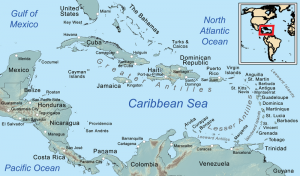
In this mix of dozens (about 40) of islands (all part of a huge archipelago chain of islands stretching from Venezuela to Florida) there are six islands that are within the influence of Netherlands (Holland), in a sort of ‘commonwealth’ association. Some are independent states now and some have the status of Dutch municipalities. These six are divided into two groups: the Leeward (Netherlands) Antilles: Aruba, Boniare and Curacao. The other group is called the Windward (Netherlands) Antilles of Sint Maarten, Saba, and Sint Eustatius. The distance from Aruba in the south to Sint Maartin in the north is about 597 miles (960.57 kilometers); they are far apart and tourists do not usually go to both on one trip. (See this comparison of the two islands.)
Aruba and Curacao have full autonomy on most matters except for defense, foreign affairs, and the Supreme Court. Tiny Bonaire has the status of a municipality within Netherlands. Confused? Get a map!
Major LGBT Rights Achievement in 2016
This is the first and best thing to know about the state of Aruba: “on the 8th of September 2016, the parliament of Aruba voted in favor of civil partnerships to same-sex couples, as the first island in the Caribbean.”
Different Lives on Aruba
Passport gay travel magazine summarizes Aruba as “the best-known of the ABCs. “The familiar Aruba is one of nonstop partying, clangorous casinos, high-rise hotels, and duty-free shops. It is a 69-square-mile island .
“The less familiar Aruba is an island of wide open spaces, otherworldly hillocks of sand, and ancient rock drawings.
There’s a third Aruba: the Aruba with an emerging gay scene. Says Luciano Maduro, president of the newly-formed ALFA (Alternative Lifestyle Federation Aruba): “Aruba doesn’t have a network yet.” ALFA Vice-President Inge Dijkhoff agrees: “Aruba has always been accepting, as long as it’s not in their face. People are out, but discreetly out. There has never been anything official.” ALFA Treasurer is Martin Van Halteren.
In his Passport report journalist Rich Rubin does not mention another part of Aruban life, the native closeted LGBT persons who live secret double lives. Like most other Caribbean countries, homophobia is present in Aruba although neither as toxic as Jamaica nor as lightweight (yet still present) as the US Virgin Islands.
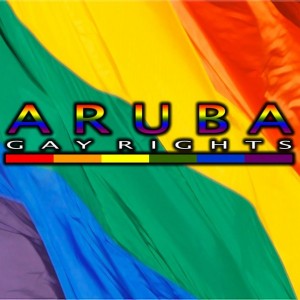 The population of Aruba is about 101,500. On this small island that makes the density about 1500 people per square mile (567 people per sq km). This is a compact population and people tend to know each other’s business and families but ‘big secrets’ such as homosexuality are more closely guarded. Why? Because Aruba’s native culture, like the rest of the world, has been spoiled by anti-gay religious beliefs, mostly Roman Catholic.
The population of Aruba is about 101,500. On this small island that makes the density about 1500 people per square mile (567 people per sq km). This is a compact population and people tend to know each other’s business and families but ‘big secrets’ such as homosexuality are more closely guarded. Why? Because Aruba’s native culture, like the rest of the world, has been spoiled by anti-gay religious beliefs, mostly Roman Catholic.
However, many LGBT people are out and proud to be so; there are a couple of LGBT organizations which they have started like ALFA and Epoca Nobo Foundation. But other native folks are not happy about their orientation and try to keep out of the public eye. Still others–probably the majority–try to deny and cover their natures by marrying and making families. The LGBT population can be estimated to be about 5-10 thousand of which fewer than a thousand can be presumed to be out. That makes a sizable segment who hide their truth and who probably seek ‘true love’ or a quickie in secret, on the ‘down low’ as it is called. This is the part of Aruba that tourists do not see unless by accident or by gaydar after hours.
Gay Aruba
Not surprising since it is a Dutch affiliate, homosexuality is not a crime in Aruba. “As part of the Kingdom of the Netherlands, Aruba is obliged to recognize same-sex marriages registered in the Netherlands as valid. The Aruban government initially declared same-sex unions illegal, but was challenged by a lesbian couple who had legally married in the Netherlands and then moved to the island. The case went to the Dutch Supreme Court, which ruled on 13 April 2007 that Aruba must recognize all marriages registered in the Netherlands.” Happily, adoption by same-sex couples is also legal. (Quote from Wikipedia)
But unlike Curacao with it highly visible gay-welcome signs, website, venues and a ‘sort-of” Pride festival (within Carnival), Aruba, with a smaller and quieter out-and-proud LGBT population offers little in the way of a ‘scene’, if it can be called that.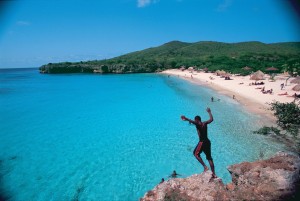
The official tourist website says the gay population is simply not large enough to support one although they say Aruba is “gay friendly” and welcomes all lifestyles”. This is ostensibly true; they do welcome all lifestyles–virtually all from abroad. In fact, in October 2012 Aruba hopes to open a phone and e-mail office and eventually a gay/lesbian center in the capital of Oranjestad. Neighboring Curacao opened a LGBT ‘Pink House’ center in 2010.
Jimmy’s Place is Aruba’s only officially gay/lesbian bar; it comes alive late at night until the early morning hours. Passport journalist Rich Rubin wrote, “People drink, chat, and kiss arriving friends. I’m swept up in the conviviality: there might be only one gay bar, but it’s great fun.”
Gay Aruba Pride in Amsterdam
In an oddly displaced Pride presence, an Aruban/Antillean homo-boat was for the first time (2008) officially entered in the Amsterdam Pride parade of canal boats during the annual Gay Pride in August. (photo below)
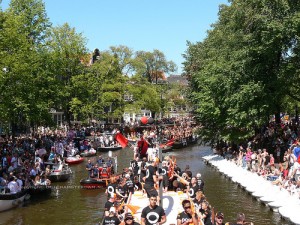 “It is time to show our face. With this boat we give openness and evidence to homosexuality within our own culture”, said Charlene Oduber, chair of Epoca Nobo Foundation to the Gay Krant newspaper . “Homo-emancipation within the Aruban and Antillean community can only be done by us. Dutch organizations often talk on behalf of Aruban and Antilleans, and it is well-meant. It therefore looks as if homosexuality is something typical Dutch. And it is this that had a disturbing effect on the social acceptance of Aruban and Antillean homosexuals within our own community.”
“It is time to show our face. With this boat we give openness and evidence to homosexuality within our own culture”, said Charlene Oduber, chair of Epoca Nobo Foundation to the Gay Krant newspaper . “Homo-emancipation within the Aruban and Antillean community can only be done by us. Dutch organizations often talk on behalf of Aruban and Antilleans, and it is well-meant. It therefore looks as if homosexuality is something typical Dutch. And it is this that had a disturbing effect on the social acceptance of Aruban and Antillean homosexuals within our own community.”
Hopefully the Aruba boat has been floated down the canal each year since then. (This writer has seen the Amsterdam canal parade once; there is nothing like it anywhere–outrageous, colorful, musical, noisy, sexy, happy and very Proud.)
Not well know is the cooperation that exists between the large Dutch COC Foundation and Antilles LGBT community. Gay Krant published this in 2010: “This weekend, representatives of the BES islands (Bonaire, St. Eustatius and Saba) along with Aruba, Curacao and St. Maarten, and COC Netherlands, will discuss priorities and strategies to handle the emancipation of the gay community in the former Netherlands Antilles.
“Now Curaçao and Sint Maarten, and Aruba, autonomous countries within the Kingdom have become like the initiators and drivers of equal rights to the various authorities. “A country that respects minorities and vulnerable groups is willing to talk to them about their position and rights.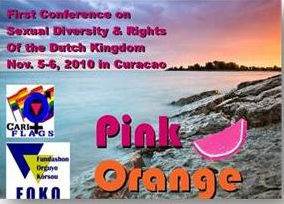 The BES islands are integral ingredient of the Netherlands and will be subject to Dutch law and policy in the field of sexual diversity. It is important in this context to take account of authentic development of every island so that the policy is effective.”
The BES islands are integral ingredient of the Netherlands and will be subject to Dutch law and policy in the field of sexual diversity. It is important in this context to take account of authentic development of every island so that the policy is effective.”
“On the multilateral meeting at the Pink House in Otrobanda, participants are FOKO, COC and OCaN from the Netherlands and Cariflags. At the end of the meeting will be a Pink/Orange agreement between all participating parties signed.” (Pink for Curacao; Orange for Netherlands.)
HIV Discrimination
Ryan Maduro, chairperson of the Institute Faro in Aruba has stated there are nineteen AIDS cases known on Aruba since 1987 (as of November 2011). However, the number of people with HIV (HIV+) is much higher, but Maduro cannot produce a precise number he depends on anecdotal reporting from family doctors. Obviously, these figures cannot give a sufficient picture.
The World Health Organization maintains the formula that in addition to every known case, there are five unknown cases. Most people with HIV are between 24 and 44 years of age and the number of young people with HIV or a STD has increased during the past three years.
It is imperative therefore that professionals study the current legislation in order to protect people who have AIDS and HIV to better protect against discrimination.
“The Aruban legislation is very outdated and contains many gaps making it impossible to act against discrimination of people with aids and HIV. Amendment of those laws should lead to a friendlier treatment.”
“As example, he mentions that people with HIV on Aruba cannot take out a life insurance nor a pension or funeral insurance. In 2002, the HIV Association in The Netherlands arranged that people with HIV could take out such insurances in that country. The insurers on Aruba are making a fuss about it, stating the risk is higher,” says the Faro chairperson.
“However, people with diabetes for example have a higher risk of becoming ill and passing away than a HIV-patient. Nevertheless, diabetes patients are accepted as insured persons.”
Also see:
Google Photo Gallery for Aruba
ALFA (Alternative Lifestyle Federation Aruba)
ALFA, gay events and activities, E-mail: alfa_aruba@hotmail.com
ALFA: Alternative Lifestyle Federation Aruba
P.O. Box 5183, Royal Plaza, Oranjestad, Aruba
Caribbean Attitudes to LGBTs
Caribbean LGBT Rights organizations
HIV & Discrimination Aruba
More summary info on Aruba
















